|
Books Should Be Free Loyal Books Free Public Domain Audiobooks & eBook Downloads |
|
|
Books Should Be Free Loyal Books Free Public Domain Audiobooks & eBook Downloads |
|
Non-fiction |
|---|
|
Book type:
Sort by:
View by:
|
By: Francis Whiting Halsey (1851-1919) | |
|---|---|
 Great Epochs in American History, Volume III
Great Epochs in American History, Volume III
This is the third volume in ten volume series of great epochs in the history of the United States, from the landing of Columbus to the building of the Panama Canal. In large part, events composing each epoch are described by men who participated in them, or were personal eye-witnesses of them. Volume III describes the French war and the Revolution and covers time period from 1745 to 1782. - Summary by Kikisaulite | |
By: François Fénelon (1651-1715) | |
|---|---|
 Lives of the Ancient Philosophers
Lives of the Ancient Philosophers
François Fénelon became a priest in 1675, Archbishop of Paris in 1679, was spiritual advisor to Madame Guyon, and was appointed tutor to Louis, Duke of Burgundy by Louis XIV in 1689. He wrote Dialogues of the Dead, and The Lives of the Ancient Philosophers as well as The Adventures of Telemachus expressly for his instruction. Fenelon wrote against the Jansenists and in favor of the Jesuits. He is also known for his Christian Perfection: Devotional Reflections on the Christian Life and Treatise on the Education of Girls.. - Summary by Wikipedia | |
By: François Norbert Blanchet (1795-1883) | |
|---|---|
 Historical Sketches of the Catholic Church in Oregon, During the Past Forty Years
Historical Sketches of the Catholic Church in Oregon, During the Past Forty Years
This book is a first-hand account of the experiences of Fr. Norbert Blanchet and his fellow missionaries to Oregon in the 1830’s and 1840’s. The original duo, Fr. Blanchet and Fr. Demers, had incredible adventures traveling across Canada by canoe, horseback, and river raft to arrive at the Hudson’s Bay Company Fort at Vancouver, Washington. From there, they energetically and joyfully established churches in the Willamette valley, along the Columbia River, and into present day Washington state and British Columbia... | |
By: François-René de Chateaubriand (1768-1848) | |
|---|---|
 Memoirs of Chateaubriand Volume IV
Memoirs of Chateaubriand Volume IV
After the extinction of Napoleon's comet on St Helena, Chateaubriand covers the Bourbon Restoration in this volume, meeting a dazzling array of literary and political figures, as his diplomatic career advances. - Summary by Nicole Lee | |
By: Frank Albert Waugh (1869-1943) | |
|---|---|
 Dwarf Fruit Trees
Dwarf Fruit Trees
This book is a handbook for the home orchardist. The propagation, pruning, choice of variety, and management of dwarf fruit trees, specifically apples, pears, peaches, and plums, are outlined. In addition, there is a section on berry bushes. It is geared towards gardeners in the United States of America and Canada. - Summary by A. Gramour | |
By: Frank Allaben (1867-1927) | |
|---|---|
 Concerning Genealogies
Concerning Genealogies
Written over a century ago, this comprehensive book offers insight into the methods used to research and compile a family history. As stated in the preface of the book, "Strong emphasis is laid upon the importance of employing the historical method..." which is sorely lacking in today's computerized compilations. - Summary by Roger Melin | |
By: Frank Bertram Wade (1875-) | |
|---|---|
 A Text-Book of Precious Stones for Jewelers and the Gem-Loving Public
A Text-Book of Precious Stones for Jewelers and the Gem-Loving Public
| |
By: Frank Evers Beddard (1858-1925) | |
|---|---|
 Book of Whales
Book of Whales
A Book of Whales is a natural history of whales for the layman. - Summary by A. Gramour | |
By: Frank G. Carpenter (1855-1924) | |
|---|---|
 Carpenter's Geographical Reader: North America
Carpenter's Geographical Reader: North America
The purpose of this book is to give to its readers a living knowledge of some of the wonders of the country and continent in which they live. Upon a personally conducted tour they are taken by the author through the most characteristic parts of the North American continent. They travel through the United States, British America, Mexico, and Central America, studying the most interesting features of life and work among the people of each country, learning how they are governed, and what they do in order to live. Much information is also given concerning the natural resources and the physical features of the countries visited. | |
 Carpenter's Geographical Reader: South America
Carpenter's Geographical Reader: South America
In this book the children are taken by the author upon a personally conducted tour through the most characteristic parts of the South American continent. The book will, it is believed, aid in putting flesh and blood on the bones of the geographies, and will give a living interest to geographical study. | |
 Carpenter's Geographical Reader: Europe
Carpenter's Geographical Reader: Europe
The book tries to give its young readers a living knowledge of Europe. The author conducts tours through various parts of Europe giving a glimpse of the people and their lives and livelihoods. He includes as well information on the natural resources and physical geography of those many countries. Summary by BettyB and preface. | |
 Around the World with the Children
Around the World with the Children
An introduction to world geography for young and old alike. Topics such as China, Japan, the American Indian, Europe and the oceans on a beginning level. Summary by BettyB | |
 Carpenter's World Travels: Australia, New Zealand and Some Other Islands of the South Seas
Carpenter's World Travels: Australia, New Zealand and Some Other Islands of the South Seas
Travel stories of the land "Down Under" from 100 years ago. Native life and scenery and commerce of islands such as Tonga and Fiji as well as the bustling city of Sydney. Summary by BettyB | |
 Alps, the Danube and the Near East
Alps, the Danube and the Near East
Journeying through many countries including Romania, Bulgaria, Turkey, Switzerland and Greece, the author gives an in-depth account of many aspects of the culture of the times and the people of the regions. | |
By: Frank Harris | |
|---|---|
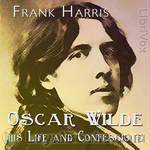 Oscar Wilde: His Life and Confessions
Oscar Wilde: His Life and Confessions
Consumers of biography are familiar with the division between memoirs of the living or recently dead written by those who “knew” the subject more or less intimately, and the more objective or scholarly accounts produced by later generations.In the case of Wilde, as presented to us by Frank Harris, we are in a way doubly estranged from the subject. We meet with Oscar the charismatic talker, whose tone of voice can never be reproduced – even if a more scrupulous biographer had set down his words accurately – and we are perhaps already aware of him as Wilde the self-destructive celebrity who uneasily fills the place of the premier gay icon and martyr in our contemporary view... | |
By: Frank Henderson | |
|---|---|
 Six Years in the Prisons of England
Six Years in the Prisons of England
A Merchant talks about daily life inside prisons of England, describes routines and how prisoners are treated. He notes stories of how fellow prisoners came to be in prison, and his ideas about the penal system, its downfalls and ways to improve it. The reader can see similarities to the problems we still have in regarding "criminals" today. (Introduction by Elaine Webb) | |
By: Frank Lewis Dyer and Thomas Commerford Martin | |
|---|---|
 Edison, His Life and Inventions
Edison, His Life and Inventions
One of the most prolific and multi-talented geniuses the world has ever seen, Thomas Alva Edison's life is indeed an inspiration for each new generation. Today we live in a world that would not have been possible if not for several of his important inventions – the electric light bulb, the motion picture camera, electric power distribution, the phonograph, and a host of other things that we take for granted today. In fact, he still holds the world record for the maximum number of patents, numbering 1093 in all! Edison – His Life and Inventions by Frank Lewis Dyer and Thomas Commerford Martin, published in 1910 was in fact a biography commissioned by Edison himself... | |
By: Frank M. (Frank Morton) McMurry (1862-1936) | |
|---|---|
 How to Study and Teaching How to Study
How to Study and Teaching How to Study
| |
By: Frank Webb (1828-1894) | |
|---|---|
 Garies and their Friends
Garies and their Friends
The book which now appears before the public may be of interest in relation to a question which the late agitation of the subject of slavery has raised in many thoughtful minds, viz. — Are the race at present held as slaves capable of freedom, self-government, and progress. The author is a coloured young man, born and reared in the city of Philadelphia. This city, standing as it does on the frontier between free and slave territory, has accumulated naturally a large population of the mixed and African race... | |
By: Franklin Allison Cresee | |
|---|---|
 Practical Pointers for Patentees
Practical Pointers for Patentees
| |
By: Franklin Beech | |
|---|---|
 The Dyeing of Cotton Fabrics A Practical Handbook for the Dyer and Student
The Dyeing of Cotton Fabrics A Practical Handbook for the Dyer and Student
| |
 The Dyeing of Woollen Fabrics
The Dyeing of Woollen Fabrics
| |
By: Franz Edelsheim (1868-) | |
|---|---|
 Operations Upon the Sea A Study
Operations Upon the Sea A Study
| |
By: Fred H. (Fred Herbert) Colvin (1867-1965) | |
|---|---|
 The Working of Steel Annealing, Heat Treating and Hardening of Carbon and Alloy Steel
The Working of Steel Annealing, Heat Treating and Hardening of Carbon and Alloy Steel
| |
By: Frederic Bastiat | |
|---|---|
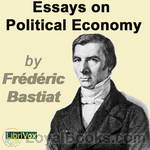 Essays on Political Economy
Essays on Political Economy
Bastiat asserted that the only purpose of government is to defend the right of an individual to life, liberty, and property. From this definition, Bastiat concluded that the law cannot defend life, liberty and property if it promotes socialist policies inherently opposed to these very things. In this way, he says, the law is perverted and turned against the thing it is supposed to defend. | |
By: Frédéric Bastiat | |
|---|---|
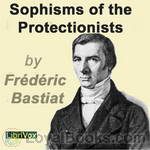 Sophisms of the Protectionists
Sophisms of the Protectionists
"To rob the public, it is necessary to deceive them," Bastiat said and believed. He reasoned, employing repetition to various applications, against fallacious arguments promoting the "Protection" of industries to the detriment of consumers and society. (Introduction by Katie Riley) | |
 Law
Law
"The law perverted! The law—and, in its wake, all the collective forces of the nation. The law, I say, not only diverted from its proper direction, but made to pursue one entirely contrary! The law becomes the tool of every kind of avarice, instead of being its check! The law guilty of that very inequity which it was its mission to punish! Truly, this is a serious fact, if it exists, and one to which I feel bound to call the attention of my fellow-citizens." —Frédéric Bastiat | |
By: Frederic DeWitt Wells (1874-1929) | |
|---|---|
 The Man in Court
The Man in Court
| |
By: Frederic Taber Cooper (1864-1937) | |
|---|---|
 Some American Storytellers
Some American Storytellers
Frederic Taber Cooper, who was an editor and author, provides a superb insight into the works of some of the most popular authors of the turn of the century decade. Excerpt: The subjects of the essays included in this volume differ widely in aim and in accomplishment; but all of them possess, to a considerable extent, the gift that makes them next of kin to the minstrel and troubadour, to the ancient fabulist, and to the forgotten spinner of the world s first nursery tales, the gift of holding the attention by the spell of the spoken word. - Summary by Celine Major | |
By: Frederick A. Talbot (1880-?) | |
|---|---|
 Aeroplanes and Dirigibles of War
Aeroplanes and Dirigibles of War
"Aeroplanes and Dirigibles of War" is an interesting read of the beginnings of air warfare in World War I. Anyone interested in early aviation and armament will find this a fascinating work. By William Tomcho. | |
By: Frederick Adam Wright (1869-1946) | |
|---|---|
 Greek Athletics
Greek Athletics
The history of Greek athletics as it pertains to the Olympics. Describes various activities such as boxing, wrestling, etc. and accounts from witnesses, the Iliad, etc. as they pertain to famous Greeks and events. He discusses Greek views of physical appearance and fitness as they pertain to the games and society and also how and why individual city-states chose to participate in the Olympics. | |
By: Frederick Boyle (1841-?) | |
|---|---|
 About Orchids, a Chat
About Orchids, a Chat
This is not a manual of instruction for orchid growers; though there are many hints on cultivation, and a few paragraphs on how to hybridize. The author is just an enthusiastic amateur orchid lover. He takes the reader on a wander through the dangers and consequences of hunting orchids in the tropical jungles of the nineteenth century, and chats about the extreme peculiarities of orchid growth, behaviour and structure, colouring the essays with his own experiences and with his delight in cultivating these beautiful plants. Beware! A new hobby beckons! | |
By: Frederick Czapek (1868-1921) | |
|---|---|
 Chemical Phenomena in Life
Chemical Phenomena in Life
Published in 1911 as part of the "Harper's Library of Living Thought," this volume presents an introduction to the chemistry of cells in the context of plant physiology and gives an interesting overview of the field of biochemistry and related sciences at the time. The author, Frederick Czapek, was a Czech botanist and professor of Plant Physiology at the University of Prague. He is perhaps best known for his two-volume work on Plant Physiology, "Biochemie der Pflanzen" and for Czapek solution agar or Czapek-Dox medium, a culture medium for cultivation of fungus species such as Aspergillus and Penicillium molds. ( | |
By: Frederick Douglass (1818-1895) | |
|---|---|
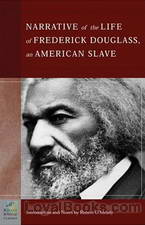 Narrative of the Life of Frederick Douglass
Narrative of the Life of Frederick Douglass
Frederick Douglass was born into slavery on a Maryland plantation. He faced hardship as a child, but later encountered owners who were relatively liberal and allowed him to learn to read, write and be in contact with freed slaves. At the age of 20, he escaped from the plantation and made his way to New York. Though he remained a fugitive, he married and changed his name to avoid being caught. He continued his education and became involved in the Abolitionist Movement. He began touring the country, speaking passionately about the unjust, cruel and inhuman practice of slavery... | |
By: Frederick G. Aflalo (1870-1918) | |
|---|---|
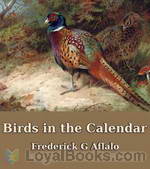 Birds in the Calendar
Birds in the Calendar
Delightful sketches of British wild birds – a bird for every month of the year from the pheasant in January to the robin in December. This collection of articles, reprinted in book form from the periodical The Outlook, is full of fascinating information about bird behaviour and habitat, as well as many interesting anecdotes. Out of date in some respects, particularly in its reference to the (now illegal) collecting of birds’ eggs, this book brings home forcefully how the populations of some British wild birds have declined since it was written. | |
By: Frederick Hugh Sykes (1877-1954) | |
|---|---|
 Aviation in Peace and War
Aviation in Peace and War
| |
By: Frederick Irving Anderson (1877-1947) | |
|---|---|
 Electricity for the farm Light, heat and power by inexpensive methods from the water wheel or farm engine
Electricity for the farm Light, heat and power by inexpensive methods from the water wheel or farm engine
| |
By: Frederick J. Tabor Frost | |
|---|---|
 American Egypt
American Egypt
Arnold and Frost were English archaeologists who traveled to the Yucatan Peninsula and wrote "the first book ever written by Englishmen on Yucatan—that Egypt of the New World, where, it is now generally admitted, Central American Civilisation reached its apogee—and to be, for the present at least, the only Englishmen who can claim to have explored the uncivilised north-eastern portions of the Peninsula and the islands of her eastern coast." Their studies brought them to the conclusion, contrary to the bulk of the body of other contemporary experts, "that America's first architects were Buddhist immigrants from Java and Indo-China." | |
By: Frederick James Furnivall (1825-1910) | |
|---|---|
 Early English Meals and Manners
Early English Meals and Manners
| |
By: Frederick Treves (1853-1923) | |
|---|---|
 Elephant Man and other reminiscences
Elephant Man and other reminiscences
In 1884, Professor Treves saw Joseph Merrick in a shop across the road from the London Hospital. Being also a teacher at the University, he brought Merrick to the London Hospital as a teaching case, and Merrick lived there until his death in April 1890. This book of "reminiscences" includes the story of the "Elephant Man" as well as other interesting cases from Sir Treves' practice as a doctor. | |
By: Frederick Whymper (1838-1901) | |
|---|---|
 Sea: Its Stirring Story of Adventure, Peril, & Heroism. Volume 1
Sea: Its Stirring Story of Adventure, Peril, & Heroism. Volume 1
Everything about the sea: history of ships, famous mariners and life on shipboard, adventure, shipwrecks and daring rescues. - Summary by Kikisaulite | |
By: Frederick Wilkinson | |
|---|---|
 The Story of the Cotton Plant
The Story of the Cotton Plant
| |
By: Frederick William Faber (1814-1863) | |
|---|---|
 Kindness
Kindness
Father Frederick William Faber was a beloved spiritual writer, preacher, and superior of the Oratory of St. Philip Neri in London. An Oxford scholar and Anglican priest since 1839, Faber converted to Roman Catholicism in 1845 following his mentor John Henry (later Cardinal) Newman. During the 1850s, Father Faber published several popular spiritual books, which have been treasured by Catholics ever since: All for Jesus, Growth in Holiness, The Blessed Sacrament, The Creator and the Creature, The Foot of the Cross, Spiritual Conferences, The Precious Blood, and Bethlehem... | |
By: Fridtjof Nansen (1861-1930) | |
|---|---|
 Farthest North
Farthest North
Being the Record of a Voyage of Exploration of the Ship "Fram", 1893-96 and of a Fifteen Months' Sleigh Journey by Dr. Nansen and Lieut. Johansen / by Fridtjof Nansen; with an Appendix by Otto Sverdrup | |
By: Friedrich Bente [translator] (d. 1930) | |
|---|---|
 Book of Concord Preface
Book of Concord Preface
The Christian Book of Concord was published in 1580 as a collection of eleven documents: Three Ecumenical Creeds and eight documents from the Reformation Era. Here is the Preface to the entire work together with the Saxon Visitation Articles from 1592. | |
By: Friedrich Christian Accum (1769-1838) | |
|---|---|
 A Treatise on Adulterations of Food, and Culinary Poisons
A Treatise on Adulterations of Food, and Culinary Poisons
| |
By: Friedrich Engels (1820-1895) | |
|---|---|
 Socialism: Utopian and Scientific
Socialism: Utopian and Scientific
The main idea of "Socialism: Utopian and Scientific" (1880) was distinguishing scientific socialism and utopian socialism. Engels begins by chronicaling the thought of utopian socialists, starting with Saint-Simon. He then proceeds to Fourier and Robert Owen. In chapter two, he summarizes dialectics, and then chronicles the thought from the ancient Greeks to Hegel. Chapter three summarizes dialectics in relation to economic and social struggles, essentially echoing the words of Marx. | |
 Condition of the Working-Class in England in 1844
Condition of the Working-Class in England in 1844
This is Engels' first book (since considered a classic account of England's working class in the industrial age), which argues that workers paid a heavy price for the industrial revolution that swept the country. Engels wrote the piece while staying in Manchester from 1842 to 1844, based on th bohis observations and several contemporary reports conducted over the period. | |
By: Friedrich Fröbel (1782-1852) | |
|---|---|
 Autobiography of Friedrich Froebel $c translated and annotated by Emilie Michaelis ... and H. Keatley Moore.
Autobiography of Friedrich Froebel $c translated and annotated by Emilie Michaelis ... and H. Keatley Moore.
| |
By: Friedrich Kerst | |
|---|---|
 Mozart, The Man and the Artist as Revealed in His Own Words
Mozart, The Man and the Artist as Revealed in His Own Words
Wolfgang Amadeus Mozart. His name is one of the most recognizable names in history and one of the most enduring of composers. At age 5, this “wunderkinder” took to the stage and began his life as a prolific and celebrated creator-genius of such luminous works the world has not known since. This collection of morsels taken from his personal letters is engaging and gives a look into the mind of the boy wonder. Was he mad? Was he miraculous? | |
By: Friedrich Nietzsche (1844-1900) | |
|---|---|
 Beyond Good and Evil
Beyond Good and Evil
Beyond Good and Evil, by Friedrich Nietzsche A searing indictment of concepts like “truth” and “language” Beyond Good and Evil, by Friedrich Nietzsche is a deeply thought provoking book that forms one of the keystones of modern thought and politics. In this book, Nietzsche takes the position that our subservience to fixed perspectives that are forced on us by our language and our ideals make us incapable of perceiving reality. He propounds the theory that ideals are not fixed but change over time, often dramatically, and end up becoming the exact opposite of what they originally were... | |
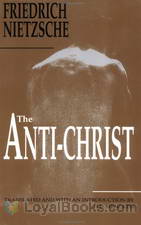 The Antichrist
The Antichrist
Save for his raucous, rhapsodical autobiography, Ecce Homo, The Antichrist is the last thing that Nietzsche ever wrote, and so it may be accepted as a statement of some of his most salient ideas in their final form. Of all Nietzsche’s books, The Antichrist comes nearest to conventionality in form. It presents a connected argument with very few interludes, and has a beginning, a middle and an end. | |
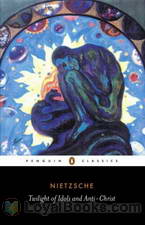 The Twilight of the Idols or How to Philosophise with the Hammer
The Twilight of the Idols or How to Philosophise with the Hammer
Of The Twilight of the Idols, Nietzsche says in Ecce Homo: “If anyone should desire to obtain a rapid sketch of how everything before my time was standing on its head, he should begin reading me in this book. That which is called ‘Idols’ on the title-page is simply the old truth that has been believed in hitherto. In plain English, The Twilight of the Idols means that the old truth is on its last legs.” Certain it is that, for a rapid survey of the whole of Nietzsche’s doctrine, no book, save perhaps the section entitled “Of Old and New Tables” in Thus Spake Zarathustra, could be of more real value than The Twilight of the Idols... | |
 Ecce Homo
Ecce Homo
The philosopher Friedrich Nietzsche’s autobiography, Ecce Homo, was the last prose work that he wrote before his illness in 1889. Coming at the end of an extraordinarily productive year in which he had produced The Twilight of the Idols and The Antichrist, Nietzsche shuns any pretense at modesty with chapter titles include “Why I am so Wise”, “Why I am so Clever” and “Why I Write Such Excellent Books”. His translator Anthony M. Ludovici states, Ecce Homo “is not only a coping-stone... | |
By: Friedrich Schiller | |
|---|---|
 The Thirty Years War
The Thirty Years War
The History of the Thirty Years War is a five volume work, which followed his very successful History of the Revolt of the Netherlands. Written for a wider audience than Revolt, it is a vivid history, colored by Schiller’s own interest in the question of human freedom and his rationalist optimism. Volume 1 covers the background of the war, through the Battle of Prague in late 1620. (Introduction by Alan Winterrowd) | |
By: Friedrich Wieck (1785-1873) | |
|---|---|
 Piano and Song
Piano and Song
This book talks about teaching, learning and performing on the piano in a delightful style, alternating between conversation and instruction. As he was the father of Clara Schumann and Robert Schumann's teacher, need I say more? | |
By: Friedrich Wilhelm Ludolf Gerhard Augustin, Baron von Steuben (1730-1794) | |
|---|---|
 Regulations for the order and discipline of the troops of the United States : part I
Regulations for the order and discipline of the troops of the United States : part I
More commonly know as "The Blue Book" written by "Baron von Steuben" this publication was key to organizing the young American military in the Revolutionary War with England. This book served both as a regulation and a how-to manual. Each officer was required to: purchase a copy upon being commissioned, carry it at all times, read it, and use it. | |
By: Fritz Kreisler | |
|---|---|
 Four Weeks in the Trenches
Four Weeks in the Trenches
A brief record of the fighting on the Eastern front in the great war by a participant in that great and terrible conflict | |
By: Fyodor Dostoyevsky (1821-1881) | |
|---|---|
 The Brothers Karamazov
The Brothers Karamazov
Set in 19th century Russia, The Brothers Karamazov (Russian: Братья Карамазовы) is the last novel written by the illustrious author Fyodor Dostoyevsky who died a few months before the book's publication. The deeply philosophical and passionate novel tells the story of Fyodor Karamazov, an immoral debauch whose sole aim in life is the acquisition of wealth. Twice married, he has three sons whose welfare and upbringing, he cares nothing about. At the beginning of the story, Dimitri Karamazov, the eldest son who is now a twenty-eight year old war veteran, returns to his home town to claim the inheritance left to him by his dead mother... | |
By: G. Campbell Morgan (1863-1945) | |
|---|---|
 Wherein?
Wherein?
These studies in the book of Malachi were delivered as addresses to the students at Mr. Moody’s Bible School in Chicago, and then to my own congregation. They have also appeared in “The Record of Christian Work” in the United States, and in “Out and Out” in England. They are now sent out in a more permanent form, after careful revision, with the prayer that they may be used of God in calling His own children into the place of power without which form is nothing. (Introduction by G. Campbell Morgan) | |
 First Century Message to Twentieth Century Christians
First Century Message to Twentieth Century Christians
G. Campbell Morgan was one of the leading evangelical preachers of his day. He began preaching at age 13 and by age 26 was teaching at the Moody Bible Institute in Chicago, Illinois. He returned to England in 1904 to become pastor at Westminster Chapel in London. He was a contemporary and friend Martyn Lloyd-Jones, F. B. Meyer and Charles Spurgeon. In this book, Morgan examines the letters to the seven churches of Asia which begin the book of Revelation in the New Testament. Over 1900 years have passed, and yet our churches today face many of the same temptations, struggles and challenges as those faced by these first century believers... | |
By: G. K. Chesterton | |
|---|---|
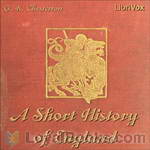 A Short History of England
A Short History of England
Gilbert Keith Chesterton was a prolific writer on many topics. His views of history were always from the standpoint of men and their interactions, and it may fairly be said he saw all of history as a battle between civilization and barbarism. So it has always been, and that remains true even today.“But it is especially in the matter of the Middle Ages that the popular histories trample upon the popular traditions. In this respect there is an almost comic contrast between the general information... | |
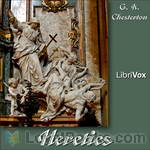 Heretics
Heretics
The Author Gilbert Keith Chesterton was born in London, England on the 29th of May, 1874. Though he considered himself a mere “rollicking journalist,” he was actually a prolific and gifted writer in virtually every area of literature. A man of strong opinions and enormously talented at defending them, his exuberant personality nevertheless allowed him to maintain warm friendships with people–such as George Bernard Shaw and H. G. Wells–with whom he vehemently disagreed. Chesterton had no difficulty standing up for what he believed... | |
 Orthodoxy
Orthodoxy
Orthodoxy is a book that has become a classic of Christian apologetics. In the book's preface Chesterton states the purpose is to "attempt an explanation, not of whether the Christian faith can be believed, but of how he personally has come to believe it." In it, Chesterton presents an original view of the Christian religion. He sees it as the answer to natural human needs, the "answer to a riddle" in his own words, and not simply as an arbitrary truth received from somewhere outside the boundaries of human experience. | |
 Charles Dickens
Charles Dickens
G. K. Chesterton was a great admirer of Charles Dickens, and wrote a noted critique of Dickens’ works expressing his opinion in his own inimitable style. | |
 Eugenics and Other Evils
Eugenics and Other Evils
Most Eugenists are Euphemists. I mean merely that short words startle them, while long words soothe them. And they are utterly incapable of translating the one into the other, however obviously they mean the same thing. Say to them “The persuasive and even coercive powers of the citizen should enable him to make sure that the burden of longevity in the previous generation does not become disproportionate and intolerable, especially to the females”; say this to them and they will sway slightly to and fro like babies sent to sleep in cradles. Say to them “Murder your mother,” and they sit up quite suddenly. Yet the two sentences, in cold logic, are exactly the same.” | |
 Miscellaneous Essays
Miscellaneous Essays
These nine files are miscellaneous short essays or stories from G. K. Chesterton. They were chosen for not only their brevity but also for being shining exemplars of Chesterton’s wit and whimsy. A fun but powerful introduction into the mind of the man that is G. K. Chesterton. | |
 Alarms and Discursions
Alarms and Discursions
Gilbert Keith Chesterton was an influential English writer of the early 20th century. His prolific and diverse output included journalism, philosophy, poetry, biography, Christian apologetics, fantasy, and detective fiction. Chesterton has been called the “prince of paradox.” He wrote in an off-hand, whimsical prose studded with startling formulations. Chesterton wrote about 4000 essays on various subjects, and “Ararms and Discursions is one of his collections. | |
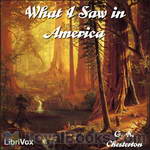 What I Saw in America
What I Saw in America
“Let me begin my American impressions with two impressions I had before I went to America. One was an incident and the other an idea; and when taken together they illustrate the attitude I mean. The first principle is that nobody should be ashamed of thinking a thing funny because it is foreign; the second is that he should be ashamed of thinking it wrong because it is funny.” (Gilbert Keith Chesterton) | |
 The New Jerusalem
The New Jerusalem
“On the road to Cairo one may see twenty groups exactly like that of the Holy Family in the pictures of the Flight into Egypt; with only one difference. The man is riding on the ass.” “The real mistake of the Muslims is something much more modern in its application than any particular passing persecution of Christians as such. It lay in the very fact that they did think they had a simpler and saner sort of Christianity, as do many modern Christians. They thought it could be made universal merely by being made uninteresting... | |
 The Crimes of England
The Crimes of England
“Second, when telling such lies as may seem necessary to your international standing, do not tell the lies to the people who know the truth. Do not tell the Eskimos that snow is bright green; nor tell the negroes in Africa that the sun never shines in that Dark Continent. Rather tell the Eskimos that the sun never shines in Africa; and then, turning to the tropical Africans, see if they will believe that snow is green. Similarly, the course indicated for you is to slander the Russians to the English and the English to the Russians; and there are hundreds of good old reliable slanders which can still be used against both of them... | |
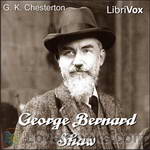 George Bernard Shaw
George Bernard Shaw
Chesterton and Shaw were famous friends and enjoyed their arguments and discussions. Although rarely in agreement, they both maintained good-will towards and respect for each other. However, in his writing, Chesterton expressed himself very plainly on where they differed and why. In Heretics he writes of Shaw: “After belabouring a great many people for a great many years for being unprogressive, Mr. Shaw has discovered, with characteristic sense, that it is very doubtful whether any existing human being with two legs can be progressive at all... | |
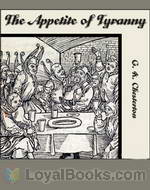 The Appetite of Tyranny
The Appetite of Tyranny
“Unless we are all mad, there is at the back of the most bewildering business a story: and if we are all mad, there is no such thing as madness. If I set a house on fire, it is quite true that I may illuminate many other people’s weaknesses as well as my own. It may be that the master of the house was burned because he was drunk; it may be that the mistress of the house was burned because she was stingy, and perished arguing about the expense of the fire-escape. It is, nevertheless, broadly true that they both were burned because I set fire to their house. That is the story of the thing. The mere facts of the story about the present European conflagration are quite as easy to tell.” | |
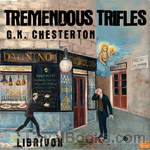 Tremendous Trifles
Tremendous Trifles
“None of us think enough of these things on which the eye rests. But don’t let us let the eye rest. Why should the eye be so lazy? Let us exercise the eye until it learns to see startling facts that run across the landscape as plain as a painted fence. Let us be ocular athletes. Let us learn to write essays on a stray cat or a coloured cloud. I have attempted some such thing in what follows; but anyone else may do it better, if anyone else will only try. ” (Gilbert Keith Chesterton) | |
 Varied Types
Varied Types
Another delightful and sharply pointed excursion into the topics of the day, and of our day as well, with Gilbert Keith Chesterton. Here he uses his wit and mastery of paradox to bring into focus a number of historical persons who in many ways typify the people who presently shape our world and who in their own right have already shaped Western civilization. These reprinted magazine articles are filled with his good natured wit and devastating ability to use reductio ad absurdum to destroy the popular myths that drive our society at full-speed into, and expose the utter nonsense that underlies, secular humanism. You will come away with yet another new collection of wonderful quotes. | |
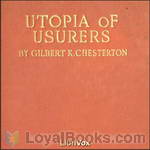 A Utopia of Usurers
A Utopia of Usurers
“Now I have said again and again (and I shall continue to say again and again on all the most inappropriate occasions) that we must hit Capitalism, and hit it hard, for the plain and definite reason that it is growing stronger. Most of the excuses which serve the capitalists as masks are, of course, the excuses of hypocrites. They lie when they claim philanthropy; they no more feel any particular love of men than Albu felt an affection for Chinamen. They lie when they say they have reached their position through their own organising ability... | |
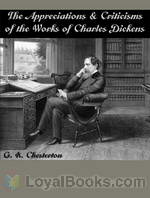 The Appreciations and Criticisms of the Works of Charles Dickens
The Appreciations and Criticisms of the Works of Charles Dickens
“These papers were originally published as prefaces to the separate books of Dickens in one of the most extensive of those cheap libraries of the classics which are one of the real improvements of recent times. Thus they were harmless, being diluted by, or rather drowned in Dickens. My scrap of theory was a mere dry biscuit to be taken with the grand tawny port of great English comedy; and by most people it was not taken at all–like the biscuit. Nevertheless the essays were not in intention so aimless as they appear in fact... | |
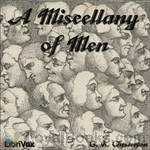 A Miscellany of Men
A Miscellany of Men
Gilbert Keith Chesterton was among the world’s most prolific writers who incorporated relentless logic, wonderful humor, and a clear view of truth into an amazing tool for exposing the foolishness of the policies of the world around him through the device of paradox.It is always great fun, and certainly always a learning experience to read Chesterton. A Miscellany of Men may be his hardest work to define, as it deals with a huge array of issues, using “personal types” as illustration. It would... | |
 Irish Impressions
Irish Impressions
“For the Irish Question has never been discussed in England. Men have discussed Home Rule; but those who advocated it most warmly, and as I think wisely, did not even know what the Irish meant by Home. Men have talked about Unionism; but they have never even dared to propose Union. A Unionist ought to mean a man who is not even conscious of the boundary of the two countries; who can walk across the frontier of fairyland, and not even notice the walking haystack. As a fact, the Unionist always shoots at the haystack; though he never hits it... | |
 Robert Browning
Robert Browning
There is an old anecdote, probably apocryphal, which describes how a feminine admirer wrote to Browning asking him for the meaning of one of his darker poems, and received the following reply: “When that poem was written, two people knew what it meant–God and Robert Browning. And now God only knows what it means. | |
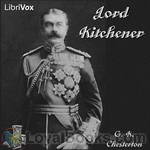 Lord Kitchener
Lord Kitchener
“The paradox of all this part of his life lies in this–that, destined as he was to be the greatest enemy of Mahomedanism, he was quite exceptionally a friend of Mahomedans.” | |
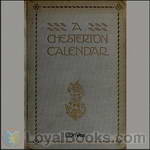 A Chesterton Calendar
A Chesterton Calendar
Go through the year, day by day, with the wit and wisdom of G.K. Chesterton! Compiled from the writings of 'G.K.C', both in verse and in prose, each day of the year is provided with a generally short quotation from one of his many works. Also includes a section apart for the moveable feasts. | |
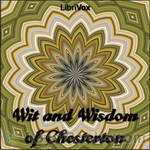 Wit and Wisdom of Chesterton
Wit and Wisdom of Chesterton
In this collection, Bevis Hillier has put together some of Chesterton's essays in "The Defandant", "Varied Types" and "Tremendous Trifles". These 12 pieces were chosen to giving a peek into the margins of Chesterton's work and give a sense of the distinctive flavor of his mind. They were also chosen with an eye to showing what a complex and fascinating character he was. | |
By: G. Melvin Herndon | |
|---|---|
 Tobacco in Colonial Virginia "The Sovereign Remedy"
Tobacco in Colonial Virginia "The Sovereign Remedy"
| |
By: G. S. Street (1867-1936) | |
|---|---|
 The Ghosts of Piccadilly
The Ghosts of Piccadilly
Nothing spooky or supernatural, but a very personal gathering of gossip, letters, and fragments of biography of famous people who have lived in Piccadilly (in London, England) ... and of some of the buildings, now long gone."If any part of any city deserves a book to itself, it is Piccadilly. We shall stand before some house in the hours when the traffic is stilled, and I shall tell of its history, of the men and women who dwelt there, and talked and loved and gambled and lived and died. I shall follow the lines of my temperament and tastes rather than those of completeness and impartiality: it is likely that I shall be voluble about Byron and reticent about Macaulay." (From the preface) | |
By: G. W. Septimus (George William Septimus) Piesse (1820-1882) | |
|---|---|
 The Art of Perfumery, and Methods of Obtaining the Odors of Plants
The Art of Perfumery, and Methods of Obtaining the Odors of Plants
| |
By: Gaius Julius Caesar | |
|---|---|
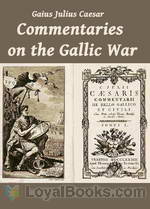 Commentaries on the Gallic War
Commentaries on the Gallic War
Commentarii de Bello Gallico (English: Commentaries on the Gallic War) is Julius Caesar's firsthand account of the Gallic Wars, written as a third-person narrative. In it Caesar describes the battles and intrigues that took place in the nine years he spent fighting local armies in Gaul that opposed Roman domination.The work has been a mainstay in the teaching of Latin to schoolchildren, its simple, direct prose lending itself to that purpose. It begins with the frequently quoted phrase "Gallia est omnis divisa in partes tres", sometimes quoted as "Omnia Gallia in tres partes divisa est", meaning "All Gaul is divided into three parts". | |
By: Gaius Sallustius Crispus (Sallust) (86-34 BC) | |
|---|---|
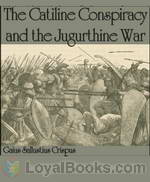 The Catiline Conspiracy and the Jugurthine War
The Catiline Conspiracy and the Jugurthine War
The Catiline Conspiracy and The Jugurthine War are the two separate surviving works of the historian commonly known as “Sallust”. Nearly contemporary to the events he describes, he is supposed to have been a retired officer of Caesar’s army. “Catiline” contains the history of the memorable year 63. Sallust describes Catiline as the deliberate foe of law, order and morality (although party politics may have influenced his view). Still, Sallust does recount Catiline’s noble traits, including his courage in the final battle... | |
By: Gaius Suetonius Tranquillus (c75 - c160 AD) | |
|---|---|
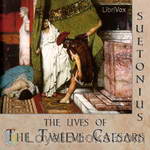 The Lives of the Twelve Caesars
The Lives of the Twelve Caesars
The Twelve Caesars is a set of twelve biographies of Julius Caesar and the first 11 emperors of the Roman Empire. The work was written in 121 during the reign of the emperor Hadrian, while Suetonius was Hadrian’s personal secretary. On the Life of the Caesars concentrates on the acts and personalities of the Julio-Claudians and their immediate successors. Together with Tacitus’ Annals, this work is a major source for the historical details in Robert Graves’ novels “I Claudius” and “Claudius the God”. | |
By: Garrett P. Serviss (1851-1929) | |
|---|---|
 Curiosities of the Sky
Curiosities of the Sky
Is there intelligent life on Mars? Why are there starless gaps in the Milky Way? What creates the Aurora Borealis or the Northern Lights? These and more are the interesting questions that are asked and sought to be answered in the 1909 book, Curiosities of the Sky by Garrett P. Serviss. Garrett Putnam Serviss was an American astronomer and popular sci-fi writer. He believed that science should be understood and enjoyed by everyone, not just by scientists. Though he was trained as a lawyer, he went to work as a newspaper reporter with The New York Sun in 1867... | |
By: Gary N. (Gary Nathan) Calkins (1869-1943) | |
|---|---|
 Marine Protozoa from Woods Hole Bulletin of the United States Fish Commission 21:415-468, 1901
Marine Protozoa from Woods Hole Bulletin of the United States Fish Commission 21:415-468, 1901
| |
By: Gaston Maspero (1846-1916) | |
|---|---|
 History Of Egypt, Chaldea, Syria, Babylonia, and Assyria
History Of Egypt, Chaldea, Syria, Babylonia, and Assyria
History Of Egypt, Chaldæa, Syria, Babylonia, and Assyria is the masterwork of one of the fathers of modern egyptology. This work, in twelve volumes, was translated from the French original, “Histoire ancienne des peuples de l’Orient classique” and published in 1903-1904. Maspero was a largely self-taught master of hieroglyphic translation. In November 1880, he was placed at the head of a French archeological mission, which developed later into the Institut Français d’Archéologie Orientale... | |
 Manual of Egyptian Archaeology and Guide to the Study of Antiquities in Egypt
Manual of Egyptian Archaeology and Guide to the Study of Antiquities in Egypt
A handbook of Egyptian archaeology, issued by the British Museum, considered suitable for British tourists travelling to Egypt in the 19th Century. (Introduction by Timothy Ferguson) | |
By: Gautama Buddha (563-483 BC) | |
|---|---|
 Der Wahrheitpfad (Dhammapadam)
Der Wahrheitpfad (Dhammapadam)
Das Dhammapada ist eine Anthologie von Aussprüchen des Buddha. Dabei sind die Verse so ausgewählt, dass sie den Kern der Lehre des Buddha wiedergeben. Es ist einer der bekanntesten Texte dieser Lehre und findet seine weiteste Verbreitung im südlichen Buddhismus. Dort begleitet es die Schüler des Buddha vom Anfang bis zum Ende ihres Pfades. Darüber hinaus ist es ein Meisterwerk sowohl der frühen buddhistischen Literatur als auch der indischen Tradition des Karvya (Belle Lettre). | |
By: Gen. George A. Custer (1839-1876) | |
|---|---|
 My Life on the Plains
My Life on the Plains
George Armstrong Custer (December 5, 1839 – June 25, 1876), one of the most mythologized figures in American history, was an United States Army officer and cavalry commander in the American Civil War and the Indian Wars. He eventually met his fate in the battle of Little Big Horn in one of the most notable defeats of American armed forces.My Life on the Plains is an autobiographical first-hand account of the Indian Wars of 1867-1869, detailing the winter campaign of 1868 in which Custer led the 7th US cavalry against the Cheyenne Indians... | |
By: Gene Sharp (1928-) | |
|---|---|
 There Are Realistic Alternatives
There Are Realistic Alternatives
Violence in society and politics, whether in the form of war, terrorism, dictatorship, oppression, usurpation, or genocide, is widely recognized as a grave problem. The objective of this essay is to explore a different perspective on the nature of the problem of widespread violence in society and politics that suggests what will be required for its resolution. We need to analyze the conditions under which it will be possible to reduce drastically the reliance on military and other violent means of conflict. We need to examine why violence is so widely regarded as necessary for good causes as well as for bad ones, and how fundamental change away from that syndrome might be achieved. | |
 From Dictatorship to Democracy
From Dictatorship to Democracy
From Dictatorship to Democracy, A Conceptual Framework for Liberation is a book-length essay on the generic problem of how to destroy a dictatorship and to prevent the rise of a new one. The book was written in 1993 by Gene Sharp (b. 1928), a professor of political science at the University of Massachusetts. The book has been published in many countries worldwide and translated into more than 30 languages. Editions in many languages are also published by the Albert Einstein Institution of Boston, Massachusetts... | |
By: Gene Stratton-Porter (1863-1924) | |
|---|---|
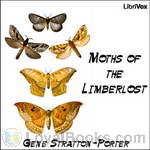 Moths of the Limberlost
Moths of the Limberlost
Gene Stratton-Porter was an American author, amateur naturalist, wildlife photographer, specializing in the birds and moths in one of the last of the vanishing wetlands of the lower Great Lakes Basin. The Limberlost and Wildflower Woods of northeastern Indiana were the laboratory and inspiration for her stories, novels, essays, photography, and movies. She was an accomplished author, artist and photographer and is generally considered to be one of the first female authors to promulgate public positions; conserving the Limberlost Swamp in her case... | |
By: General Sir John Miller Adye (1819-1900) | |
|---|---|
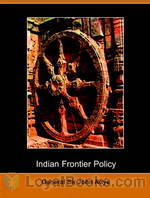 Indian Frontier Policy, an Historical Sketch
Indian Frontier Policy, an Historical Sketch
“The subject of our policy on the North-West frontier of India is one of great importance, as affecting the general welfare of our Eastern Empire, and is specially interesting at the present time, when military operations on a considerable scale are being conducted against a combination of the independent tribes along the frontier. It must be understood that the present condition of affairs is no mere sudden outbreak on the part of our turbulent neighbours. Its causes lie far deeper, and are the consequences of events in bygone years”. (From the author’s Preface, 1897). | |